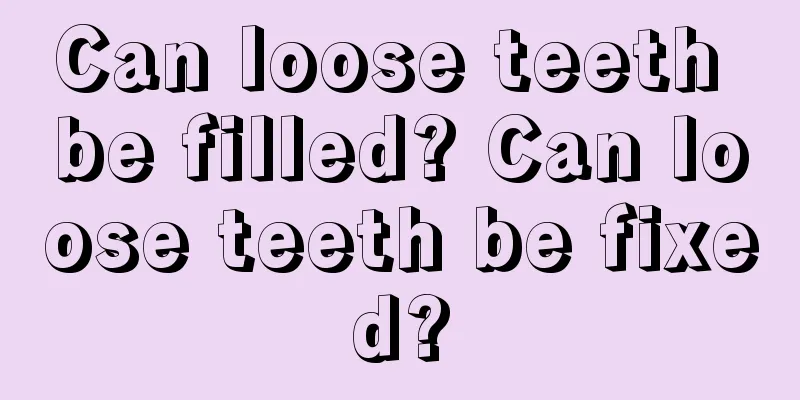Can loose teeth be filled? Can loose teeth be fixed?

|
Teeth should be strong and indestructible, but some people may have dental problems, such as loose teeth. Loose teeth include many factors, and different factors have different types of looseness. Generally, our teeth are tiny and not easy to detect. Only when lesions occur around the teeth and the amplitude of movement increases, will serious situations occur. Loose teeth are caused by many factors. Due to different causes and degrees of looseness, the treatment methods are also different. Under normal circumstances, our teeth have slight mobility, which is generally not easy to detect. Only when lesions occur around the teeth and the mobility increases, can it be discovered. Generally speaking, single-root teeth are more likely to loosen than multi-root teeth, and short roots are more likely to loosen than thick roots. Loose teeth are most common in teeth with periodontal disease. Due to the loss of supporting tissues such as the periodontal membrane and alveolar bone, the tooth roots are exposed and the teeth become loose. If the looseness is mild, it will usually return to normal through effective periodontal treatment. If the looseness is moderate, the loose teeth should be ligated and fixed together with the adjacent teeth while treating the periodontal disease to reduce the load on the loose teeth and prevent the looseness from getting worse. At this time, most loose teeth cannot be restored. If the looseness is severe, it means that the teeth are loose Ⅲ", that is, the teeth are obviously loose up and down, left and right. At this time, the method of extracting the affected teeth is often used to avoid adding unnecessary burden to the adjacent teeth. When the bite force of individual teeth is too strong or the bite relationship is abnormal, it can cause vertical absorption of the alveolar bone, widen the periodontal membrane space, and the teeth may also become loose. Generally, after the doctor adjusts the bite, the bite trauma is eliminated, the alveolar bone can repair itself, and the teeth can also return to a stable state. When teeth are subjected to acute trauma, such as external blows or biting hard objects, they may also become loose. If the tooth is slightly loose, you can take anti-inflammatory drugs (spiramycin, lincomycin, etc.). Once the inflammation subsides, the tooth will automatically return to a stable state. If the tooth is severely loose or dislocated or shifted, the tooth should be repositioned and then ligated to the adjacent teeth. Take anti-inflammatory drugs, maintain oral hygiene, and prohibit using this tooth in the short term. After 1 to 2 months, the tooth will return to normal. When periodontitis or apical periodontitis occurs acutely, manifesting as periodontal or periapical abscesses, the affected teeth will also feel floating and feel loose. Once the acute inflammation is relieved, the loose teeth will also be reduced or disappear. During the transition period between deciduous and permanent teeth, the deciduous teeth may become loose due to root absorption and are about to fall out. This is a normal physiological phenomenon and there is no need to worry. |
<<: What kind of water is best to drink after exercise
>>: How to whiten teeth with lemon
Recommend
What is the best medicine for chronic enteritis
Enteritis can generally be divided into acute ent...
What are the dangers of taking laxatives for a long time
In modern life, people's pace of life has bec...
Can foot patches be applied to the belly button?
Foot patches are medicines that are applied to th...
What are the benefits of potato peels?
Potatoes are a common vegetable in all households...
How to diagnose bone cancer
With the progress of the times, people's livi...
My temple hurts when I wake up in the morning
Many people will encounter some unexpected proble...
Can natural forehead wrinkles be removed
Many people will find wrinkles on their forehead ...
What are the treatments for esophageal cancer
After getting esophageal cancer, anyone will feel...
What to do if thighs are rubbed
Many people feel that their thigh roots are rubbe...
Why do I have a sore throat when I wake up in the morning?
If your throat is particularly sore when you wake...
How many years can you live after laryngeal cancer surgery
Cancer is a systemic disease. Surgery is a local ...
Can vinegar be used externally to reduce inflammation?
Vinegar is a common condiment in our lives. It ha...
How to wash your face with milk
Milk is rich in calcium, and drinking milk is ver...
Three major advantages of live cell therapy
With the continuous rapid development of medical ...
How to lower cholesterol and blood lipids?
Nowadays, people's living standards are getti...









